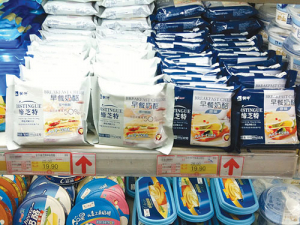Yoghurt and cheese have been winning categories in China in recent years, says market intelligence agency Mintel.
Yoghurt has maintained an annual retail sales growth of at least 20% since 2014, and cheese has grown 15 - 25% from 2015 - 17.
And Mintel’s research shows Chinese consumers willingly pay a premium for dairy products with healthy attributes. Imported dairy products are still more popular despite consumers regaining their confidence in domestic milk sources.
Looking ahead, Mintel forecasts the dairy market will grow at 6.6% compound value per year to $79.5 billion in 2022.
Despite consistent sales growth for yoghurt and cheese, Mintel Market Sizes data shows that annual per capita volume consumption of major dairy products remains low compared to other countries. For example, per capita milk consumption in China is 14.3L versus 36.8L in Japan and 51.7L in the US; per capita consumption of yoghurt in China is 3.43kg versus 4.92kg in the US and 9.66kg in Japan; and Chinese consume only 0.02kg of cheese per person versus 1.46kg in Japan and 6.89kg in the US.
Summer Chen, senior food and drink analyst at Mintel, says dairy consumption in China is low compared to Japan, where consumers share a similar dietary tradition to China.
“Mintel research indicates that China’s dairy market growth will be driven by increased consumption, resulting from the expansion of consumption occasion, value increase due to the rising price of raw milk, and consumers trading up to more premium options.
“In the yoghurt market, thanks to the recent craze over ambient yoghurt, the category is now leading not only in China’s dairy market but among all food and drink products.”
In dairy products, health-related factors are the main things consumers are willing to pay more for. Among the four surveyed dairy products (milk, yoghurt, butter and cheese), milk and yoghurt are perceived by consumers to be healthier and more nutritious (51% and 48% respectively), helping to improve immunity (49% and 44% respectively), and also good for kids (51% and 49% respectively) and the elderly (46% and 37% respectively).
In general, urban Chinese consumers prefer dairy products from big (65%) and nationwide (59%) dairy brands. Their attitudes towards local milk sources are divided: 44% believe they are reliable, while 36% believe local milk sources are not reliable. Nevertheless, more consumers prefer imported dairy products (43%) than domestic ones (34%). Even among those who trust local milk sources, 32% prefer imported dairy products.











